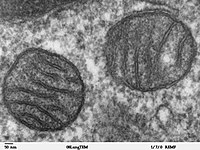
Association of Cutaneous Immune-Related Adverse Events With Increased Survival in Patients Treated With Anti-Programmed Cell Death 1 and Anti-Programmed Cell Death Ligand 1 Therapy.
Sign Up to like & getrecommendations! Published in 2022 at "JAMA dermatology"
DOI: 10.1001/jamadermatol.2021.5476
Abstract: Importance Despite the efficacy of immune checkpoint inhibitors (ICIs), cutaneous immune-related adverse events (cirAEs) occur in 20% to 40% of all treated patients. To our knowledge, little is known about the predictive value of these… read more here.
Keywords: cell death; therapy; programmed cell; anti programmed ... See more keywords

Assessment of Capecitabine and Bevacizumab With or Without Atezolizumab for the Treatment of Refractory Metastatic Colorectal Cancer
Sign Up to like & getrecommendations! Published in 2022 at "JAMA Network Open"
DOI: 10.1001/jamanetworkopen.2021.49040
Abstract: Key Points Question Does targeting programmed cell death 1 or programmed cell death ligand 1 enhance the clinical benefits of anti–vascular endothelial growth factor therapy in patients with refractory metastatic colorectal cancer (mCRC)? Findings In… read more here.
Keywords: programmed cell; capecitabine bevacizumab; cell death; capecitabine ... See more keywords

Identification and functional characterization of a bacterial homologue of Zeta toxin in Leishmania donovani
Sign Up to like & getrecommendations! Published in 2019 at "FEBS Letters"
DOI: 10.1002/1873-3468.13429
Abstract: Zeta‐toxin is a cognate toxin of epsilon antitoxin of prokaryotic Type II toxin‐antitoxin system (TA) and play an important role in cell death. An orthologue of bacterial‐zeta‐toxin (BzT) was identified in Leishmania donovani with similar… read more here.
Keywords: leishmania donovani; zeta toxin; toxin; cell death ... See more keywords

Selective induction of cancer cell death by VDAC1‐based peptides and their potential use in cancer therapy
Sign Up to like & getrecommendations! Published in 2018 at "Molecular Oncology"
DOI: 10.1002/1878-0261.12313
Abstract: Mitochondrial VDAC1 mediates cross talk between the mitochondria and other parts of the cell by transporting anions, cations, ATP, Ca2+, and metabolites and serves as a key player in apoptosis. As such, VDAC1 is involved… read more here.
Keywords: cell death; vdac1 based; cancer cell; cancer ... See more keywords

Bcl‐2 inhibitors enhance FGFR inhibitor‐induced mitochondrial‐dependent cell death in FGFR2‐mutant endometrial cancer
Sign Up to like & getrecommendations! Published in 2019 at "Molecular Oncology"
DOI: 10.1002/1878-0261.12422
Abstract: Endometrial cancer is the most commonly diagnosed gynaecological malignancy. Unfortunately, 15–20% of women demonstrate persistent or recurrent tumours that are refractory to current chemotherapies. We previously identified activating mutations in fibroblast growth factor receptor 2… read more here.
Keywords: bcl; death; endometrial cancer; cell death ... See more keywords

Targeted inhibition of STAT3 induces immunogenic cell death of hepatocellular carcinoma cells via glycolysis
Sign Up to like & getrecommendations! Published in 2022 at "Molecular Oncology"
DOI: 10.1002/1878-0261.13263
Abstract: In hepatocellular carcinoma (HCC), the signal transducer and activator of transcription 3 (STAT3) is present in an overactive state that is closely related to tumour development and immune escape. STAT3 inhibition reshapes the tumour immune… read more here.
Keywords: cell death; cell; inhibition; hcc ... See more keywords

The antiviral drug telaprevir induces cell death by reducing FOXA1 expression in estrogen receptor α (ERα)‐positive breast cancer cells
Sign Up to like & getrecommendations! Published in 2022 at "Molecular Oncology"
DOI: 10.1002/1878-0261.13303
Abstract: Previously, we found that telaprevir (Tel), the inhibitor of hepatitis C virus NS3/4A serine protease, reduces estrogen receptor α (ERα) content at the transcriptional level without binding to the receptor, prevents ERα transcriptional activity, and… read more here.
Keywords: cell death; estrogen receptor; breast cancer; induces cell ... See more keywords

Bioactive Iridium Nanoclusters with Glutathione Depletion Ability for Enhanced Sonodynamic‐Triggered Ferroptosis‐Like Cancer Cell Death
Sign Up to like & getrecommendations! Published in 2022 at "Advanced Materials"
DOI: 10.1002/adma.202206286
Abstract: Ferroptosis is a regulated form of necrotic cell death that involves the accumulation of lipid peroxide (LPO) species in an iron‐ and reactive oxygen species (ROS)‐dependent manner. Previous investigations have reported that ferroptosis‐based cancer therapy… read more here.
Keywords: cell death; ferroptosis like; ferroptosis; cancer ... See more keywords

Cuproptosis Induced by ROS Responsive Nanoparticles with Elesclomol and Copper Combined with αPD‐L1 for Enhanced Cancer Immunotherapy
Sign Up to like & getrecommendations! Published in 2023 at "Advanced Materials"
DOI: 10.1002/adma.202212267
Abstract: Cuproptosis is a new cell death that depends on copper (Cu) ionophores to transport Cu into cancer cells, which induces cell death. However, existing Cu ionophores are small molecules with a short blood half‐life making… read more here.
Keywords: cell death; cuproptosis; cancer; copper ... See more keywords

Augmenting Immunogenic Cell Death and Alleviating Myeloid-Derived Suppressor Cells by Sono-Activatable Semiconducting Polymer Nanopartners for Immunotherapy.
Sign Up to like & getrecommendations! Published in 2023 at "Advanced materials"
DOI: 10.1002/adma.202302508
Abstract: Inducing immunogenic cell death (ICD) by sonodynamic therapy (SDT) is promising for cancer immunotherapy, which however is inefficient due to oxygen depletion that compromises SDT effect and mediates recruitment of immunosuppressive myeloid-derived suppressor cells (MDSCs).… read more here.
Keywords: cell death; semiconducting polymer; myeloid derived; polymer ... See more keywords

Optogenetic Control of Non‐Apoptotic Cell Death
Sign Up to like & getrecommendations! Published in 2021 at "Advanced Science"
DOI: 10.1002/advs.202100424
Abstract: Abstract Herein, a set of optogenetic tools (designated LiPOP) that enable photoswitchable necroptosis and pyroptosis in live cells with varying kinetics, is introduced. The LiPOP tools allow reconstruction of the key molecular steps involved in… read more here.
Keywords: non apoptotic; apoptotic cell; cell death; optogenetic control ... See more keywords